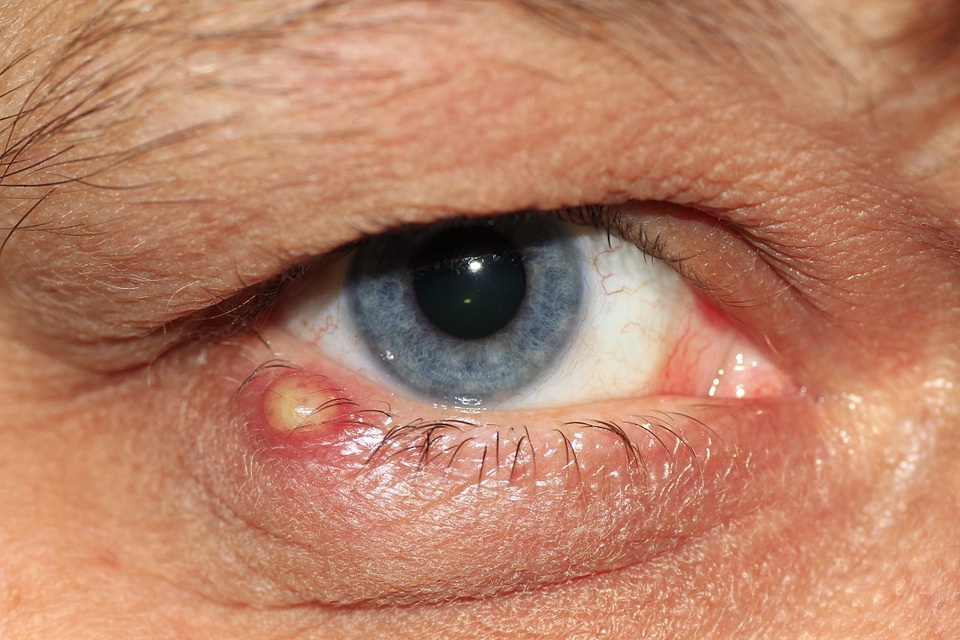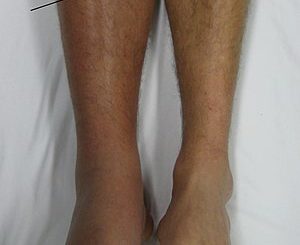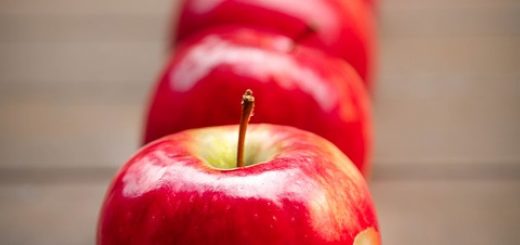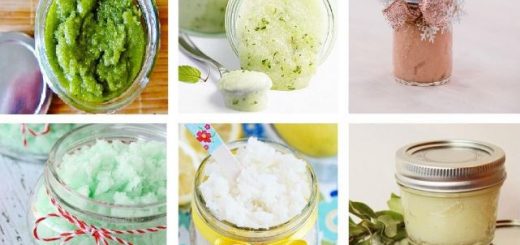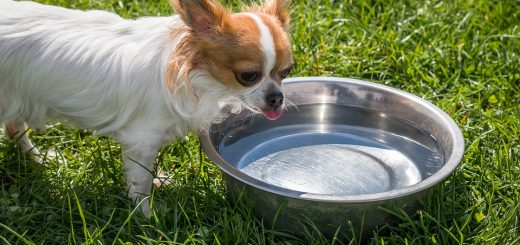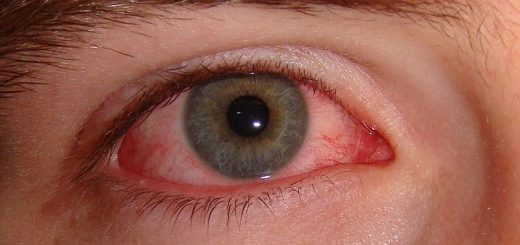39 Home Remedies for Postnasal Drip
A postnasal drip is something most everyone has had but that not many can recognize by the name. Every day, people swallow small amounts of mucus. This mucus usually comes from the sinuses, mixes with salvia, and causes people no problems. However, sometimes the body makes too much mucus, which makes it harder to swallow. Sometimes the mucus comes out the nose (making a runny nose), while other times it runs down the back of your throat (postnasal drip).
Symptoms
Since the sinuses are so heavily involved with the production, one might think that a postnasal drip would affect the nose. While sometimes it can lead to a sinus infection, it is more likely to affect the throat. Some of the most common symptoms of a postnasal drip are listed below.
- Persistent wet cough
- Sore throat
- Hoarse voice
- Congestion
- Earache
Causes
How does one get a postnasal drip? It’s almost easier to get a postnasal drip than it is to avoid. Postnasal drips can happen as a result of colds, flus, hay fever, allergies, changes in the weather, trigger foods or scents, and more.
Because there are so many causes of postnasal drip, it can be hard to avoid. Luckily, it is not a major health problem and it rarely leads to anything more complicated than a sinus or ear infection. This is part of the reason why it is so easy to treat with home remedies. However, you may want to see a doctor if you cough up blood or if you suffer from postnasal drip for more than ten days.
Home Remedies for Postnasal Drip
-
Allergy Pills
Allergies to dust, pet dander, and the like are common causes of postnasal drip. While taking allergy pills isn’t exactly a “natural” home remedy, it is one that is efficient. Taking allergy pills can not only stop postnasal drip in its tracks, but it can also prevent it if you do not already have it. Taking daily 24-hour allergy pills is one of the best ways to keep postnasal drip at bay.

Even though your furry friend loves you, they can still trigger allergies and postnasal drip whether they want to or not
- Watch for Trigger Foods and Scents
Postnasal drip can be triggered by eating certain foods, drinking certain drinks, or even smelling certain smells. Triggers are likely to be different for each person. Sometimes, triggers are based on allergies. Both eating or smelling something that you are allergic to can trigger the symptoms.
If you have postnasal drip often, you may want to begin recording what you are eating, drinking, or smelling before the symptoms appear. This way, you can notice patterns and better avoid the trigger in the future.
-
Vitamin C
Vitamin C is great to take in whenever you are feeling ill. This vitamin can help to boost the immune system. Having a healthy immune system can work to keep the cold and flu at bay, which can sometimes cause postnasal drip. You can take in more of this vitamin by taking vitamin supplements or eating foods that are naturally rich in vitamin C. Citrus fruits, including oranges and lemons, are high in vitamin C. If you do not like citrus, you can eat other fruits, as most fruits contain vitamin C.
-
Stay Hydrated
It might seem strange to take in more liquid when there is excess mucus going down your throat, but this is actually one of the best things you can do to cure a postnasal drip. Drinking plenty of water and other fluids can help to both dilute the mucus so it is not so thick and help to treat a sore throat that often results in a symptom of postnasal drip.
-
Hot Shower
Breathing in steam is a great way to clear out and open up the sinuses. Since the mucus that causes postnasal drip originates in the sinuses, it is best to keep them cleared out. Standing in a steaming hot shower until your sinuses feel clear. Do this up to twice a day to get the best results.
-
Clean Bedsheets
Dust mites and other allergens can trigger postnasal drip. Believe it or not, beds are often covered in dust mites. It is best to wash your sheets and change your covers often. Wash your sheets about once a week, not just when they get messy. Doing this can both prevent and treat postnasal drip.

Sleeping with clean sheets can generally improve the quality of sleep as well
-
Air Filters
Dust and allergens can fill the air, even in your own home. This is especially true if you have pets that shed. One way to keep the air clean is to use an air filter. Like keeping your sheets clean, this can also help to prevent and treat postnasal drip.
- Warm Beverages
Drinking warm beverages can be a great way to treat a sore throat, which is one of the most common symptoms of postnasal drip. Try drinking teas, warm cider, or hot water with lemon juice to both keep hydrated and to keep your throat lubricated.
-
Chicken Soup
It’s not a myth–chicken soup really is great at treating the cold, and the postnasal drip that often comes with it. Chicken is full of natural antioxidants which can help to boost the immune system. Adding vegetables and spices to your soup can make the soup even more beneficial. Eat chicken soup once a day to get the best results.
-
Avoid Dairy Products
Dairy products encourage your body to produce mucus. This is the last thing you want when you have postnasal drip. It is best to avoid dairy products in general (milk, yogurt, cheese, etc.) until you no longer have postnasal drip symptoms.
-
Ginger Tea
As mentioned earlier in this article, drinking tea is a great way to keep the throat lubricated. Ginger tea is especially useful because it reduces inflammation. Inflammation due to postnasal drip can cause a sore throat. So, drinking ginger tea is a great way to treat a sore throat from two angles instead of one.
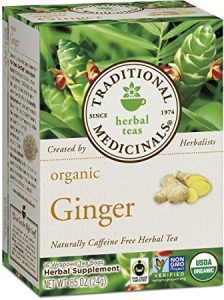
Traditional Medicinals Organic Ginger Tea, 16-pack ($3.75)
-
Spicy Foods in Moderation
Spicy foods affect different people in different ways. In some people, they can trigger postnasal drip, in others, they can lighten the mucus, making it easier to pass. The only way to know which type of person you are is to try spicy food in moderation. If it lowers your symptoms, keep it up. If it makes it worse, avoid it until you heal.
-
Humidifier
Sore throats can sometimes be caused by dryness. Drinking water is one way to hydrate the throat directly and using a humidifier is a way to hydrate the throat indirectly. Use one as you see fit to ease your symptoms.
-
Saline Solution
Saline solutions are a sort of salt water solution that can be used to clear away mucus in the nose. One of the best ways to do this is to fill a neti pot with some saline solution. Put the spout of the pot in one nostril and tip the pot until water comes out the other. Repeat this with both nostrils. This will work to clear out the sinuses, which can ease the symptoms of postnasal drip.
-
Salt Water Gargle
Using a salt water gargle, which has a different ratio of salt and water than a saline solution, is a great way to clear some mucus out of the back of the throat. To use this home remedy, mix a tablespoon of salt in a cup of warm water. Gargle and spit out this water a sip at a time until the cup is empty. Do this as often as needed to rid your head of excess mucus.
-
Avoid Caffeine and Alcohol
Taking in caffeine and alcohol will do nothing to make your postnasal drip symptoms better. In fact, it will only make things work. While both of these come in beverages, they do more to dehydrate than hydrate the body. Avoid drinking beverages containing either caffeine or alcohol until you no longer have postnasal drip symptoms.
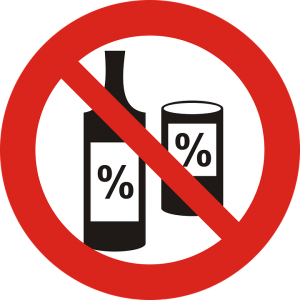
Avoid these beverages until your postnasal drip is cured
-
Apple Cider Vinegar
Apple cider vinegar is acidic, which makes it great at clearing out excess mucus in throat. To use this home remedy, all you need to do is drink a simple apple cider vinegar and water mix. To make this, add two tablespoons of apple cider vinegar to a cup of warm water. You can also add honey and/or lemon juice if you like. Drink this up to three times a day to get the most out of this home remedy.
-
Honey
Consuming honey is a great way to lubricate the throat. This can both help to ease a sore throat and cough that often accompany postnasal drip. As an added bonus, honey is loaded with antioxidants, which any ill body can use more of. Simply add more honey to your diet to use this home remedy.
-
Garlic
Garlic is often discussed in our articles because it seems to be a natural cure-all. It is anti-inflammatory in nature, which is great for treating postnasal drip. Using this home remedy is simple; all you have to do is add more garlic to your diet.
-
Vitamin D
Aside from vitamin C, vitamin D is another healthy vitamin that can help to fight the symptoms of postnasal drip. This home remedy works so well because it is antibacterial, which can make sure that the postnasal drip doesn’t develop into something worse. Since it is best to avoid dairy products, some other natural sources of vitamin D to try to include salmon, sardines, tuna, shellfish, eggs, and mushrooms.
-
Vapor Rub
Using vapor rub is a great way to open up the sinuses. This is especially useful if you also have a stuffy nose. Use this as directed on the container to get the best results.
-
Peppermint Essential Oil
To get a more “natural” effect of what vapor rub does, you can instead use peppermint oil. While it has the same general effects on the body as vapor rub does, it is used differently. One of the best ways to use peppermint oil to treat a postnasal drip is to breathe in steam with the oil in it. Taking a bath with up to eight drops of this oil in the water or putting peppermint essential oil in a diffuser are both great ways to use this home remedy.
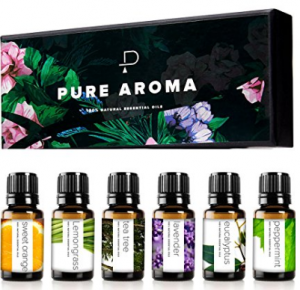
100% PURE AROMA Essential oils 6-pack (Eucalyptus, lavender, lemon grass, orange, peppermint, and tea tree). ($6.95)
-
Turmeric
Turmeric is a spice that is a natural decongestant. This means that it can help to clear out the sinuses. Using this home remedy is simple. All you need to do is take in more of this spice. It tastes great in Indian cuisine and in soups. Try adding it to your chicken soup for extra health benefits.
-
Zinc
Taking zinc supplements or eating foods that are naturally rich in zinc can help to relieve cold symptoms. Since postnasal drip is a common cold symptom, this home remedy can work wonders. Some foods that are high in zinc you may want to try include meat, seafood and shellfish, beans, nuts, and seeds.
-
Green Tea
Green tea is full of antioxidants. Drinking three cups of green tea can not only cure postnasal drip, but it can also boost the immune system. Having a higher immune system means that you will be less likely to be ill again in the near future.
-
Aloe Vera Juice
Aloe vera juice is great for treating a cough, which is often a symptom of postnasal drip. To use this home remedy, simply take a tablespoon of aloe vera juice. Do this up to four times a day to treat your cough.
-
Quit Smoking
Smoking will only aggravate the symptoms of postnasal drip. Not only will it make the coughing worse, smoking also makes it more likely that you will get postnasal drip the next time you are sick. To better your health in many ways, it is best to quit smoking as soon as possible.

Quit smoking as soon as possible to get the fastest results
-
Cayenne Pepper
Cayenne pepper can be eaten as is or in its powdered form. For the use of this home remedy, it is better to use powdered cayenne pepper. This is simply because it is easier to add this to your meals. Cayenne pepper helps to reduce inflammation, which will ease the symptoms of postnasal drip. The easiest way to use this home remedy is to add cayenne pepper to your meals.
-
Cinnamon
Cinnamon is loaded with antioxidants. Like green tea, cinnamon can also help to boost the immune system. There are a couple of different ways to use this home remedy. The easiest way to use this home remedy is to drink cinnamon tea several times a day. Another way to use cinnamon is to add it to your meals; it is often added to Indian dishes.
-
Cumin
Like powdered cayenne pepper, cumin is another anti-inflammatory spice. Taking in more of this spice can help to open up the airways, which can make it less likely for mucus to go down your throat. Although; it may still run out of your nose. The best way to use this home remedy is to add it to your meals. It tastes great in Mexican dishes.
-
Tulsi Tea
Tulsi tea is a double-threat when it comes to combating postnasal drip. Like many of the other remedies on this list, it is anti-inflammatory. The bonus is that it is also a decongestant, which can help to clear out excess mucus faster. To use this home remedy, drink three cups of tulsi tea a day until you are cured.
-
Horseradish
Eating horseradish is one way to naturally remove mucus from the body. Not only can this help with postnasal drip, but it can also clear up chest congestion and a runny nose. This home remedy is simply to use– you can either eat it alone or add it to your meals once a day.

Top your meals with horseradish as a tasty way to incorporate it into your diet
-
Cabbage
Cabbage is a leafy green that is naturally rich in probiotics. While yogurt is usually eaten as a source of probiotics, it is best not to consume it while suffering from postnasal drip, as it is a dairy product. That is why cabbage is a worthy alternative source of probiotics. To use this home remedy, simply add more cabbage to your diet.
-
Basil
Basil is a herb that is naturally antibacterial; this means that it can help to kill the bacteria that may be causes your postnasal drip and any accompanying symptoms. To use this home remedy, you can either drink basil tea up to three times a day or add basil to your meals. Basil is a herb best added to Italian dishes.
-
Omega-3
Fish, other types of seafood, nuts, and seeds are some of the primary natural sources of omega-3. Omega-3 is a natural fatty acid that helps to reduce inflammation. To get the most out of this home remedy, you can either eat the foods that naturally contain omega-3 daily or take omega-3 supplements as directed.
-
Berries
Eating berries is a tasty way to take in vitamin C, antioxidants, and flavonoids, all of which can help to treat the symptoms of postnasal drip. All you have to do to use this home remedy is to eat a serving of berries a day. A serving size of berries is usually one cup.
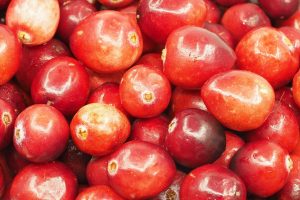
Eating fresh or canned cranberries can also help
-
Dark Leafy Greens
Dark leafy greens, much like cabbage, can also help to treat postnasal drip. They contain vitamins and carotenoids that can help to treat the sinuses, which, if healed, will heal the postnasal drip. Some popular types of dark leafy greens to eat include lettuce, spinach, and kale. Add one or more of these vegetables to your diet to see results.
-
Eucalyptus Essential Oil
Inhaling the sweet scent of eucalyptus essential oil can help to clear mucus out of the sinuses and the throat. The best way to use this home remedy is to put some of this essential oil in a diffuser. If you do not have a diffuser, you can instead put up to eight drops of this oil in a hot bath and soak in it for at least twenty minutes.
-
Onion
Lastly, onions can help to treat postnasal drip, as they are rich in antioxidants and can help to reduce inflammation. To use this home remedy, all one needs to do is eat more onions. If you cannot stand chopping onions, dry adding powdered onion to your meals instead.
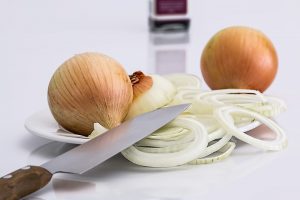
White onions will work the best for this, but other types of onions can also provide some relief
Which of these home remedies will you try? Comment below!
References
https://www.webmd.com/allergies/postnasal-drip#1
https://www.verywellhealth.com/post-nasal-drip-remedies-89304
https://www.stylecraze.com/articles/causes-symptoms-and-treatments-of-post-nasal-drip/#gref
https://www.healthline.com/nutrition/9-foods-high-in-vitamin-d
https://www.healthline.com/nutrition/best-foods-high-in-zinc

